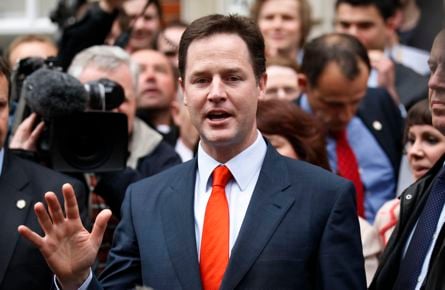UK election: The cool Thursday-night hang
The UK situation shouldn’t be seen as a chance to refight our 2008 coalition crisis
glegg
Share
 The whole point of a Parliament is that outcomes depend on numbers and circumstance, and are settled by the MPs themselves, according to their lights and their politics. So the highly entertaining crowd of Hill rats who gathered at the UK High Commission on Elgin Street on Thursday were mistaken, if understandable, in their desire to use the UK election results as a chance to refight our 2008 coalition crisis. The two situations aren’t the same. The long night’s events in the UK offer few lessons worth applying to the last time things got weird in Ottawa. But maybe a few that can help everyone plan for the next.
The whole point of a Parliament is that outcomes depend on numbers and circumstance, and are settled by the MPs themselves, according to their lights and their politics. So the highly entertaining crowd of Hill rats who gathered at the UK High Commission on Elgin Street on Thursday were mistaken, if understandable, in their desire to use the UK election results as a chance to refight our 2008 coalition crisis. The two situations aren’t the same. The long night’s events in the UK offer few lessons worth applying to the last time things got weird in Ottawa. But maybe a few that can help everyone plan for the next.
Differences: Recall that the 2008 coalition crisis wasn’t an election-night crisis because on election night, even Stéphane Dion realized his numbers were indefensible. As a bonus, he’d spent the last two weeks of the campaign explaining to everyone that he would never cook a deal with that wild-eyed socialist Jack Layton. Also note that in Canada in 2008, the incumbent government didn’t lose its plurality. Stephen Harper increased his lead, in other words, whereas Gordon Brown blew his. Never even mind the whole separatist Bloc Québécois thing, a confounding variable if ever there was one: just on the numbers, the UK situation now isn’t the Canadian situation then. I find myself having to explain, again and again, just what a turkey the Dion-Layton coalition was, because the people who went a little crazy and wanted that thing to fly really don’t like to think about how weak their hand was.
But the other difference lies, not just in the numbers, but in the protagonists’ reactions. Nobody at any point in this weird campaign ruled out cooperating with other parties, on a formal or informal basis. That’s because everybody in the world is a better strategist than Stéphane Dion, and also because it is radically irresponsible for any parliamentarian to foreclose options that may turn out to be legitimate and even necessary. (The UK leader who spent the most time speculating about alternative outcomes was Nick Clegg — which is understandable, but I wonder whether it had something to do with his late-inning fade: it is unattractive to hear a guy muse endlessly about how he’ll play a hand the voter hasn’t yet dealt him.)
I suspect by Friday afternoon the numbers will be clearer and options that seemed possible at dawn on election day will be foreclosed. But in the wide-open circumstances that hold as I write this, Brown has the right that any incumbent PM has to test the Commons. He has at best a very tenuous shot at winning an early confidence test, and that’s even if Nick Clegg will give him the time of day. Clegg’s claim to choose the next government is seriously weakened by his mediocre seat count. Cameron has done well by many measures — he beat off a serious mid-campaign challenge from Clegg, he remains personally popular at at time when that’s going to be crucial — but he must be disappointed with his seat total.
My hunch is that Clegg hasn’t the clout to do Brown any good even if he wanted to and that David Cameron is the next Prime Minister, a job which had better season him quickly because he still seems to need it. But the very clear lesson to any Canadian politician watching this should be: do not foreclose any option because you can never know what cards you’ll have and which you’ll need when the votes are in.